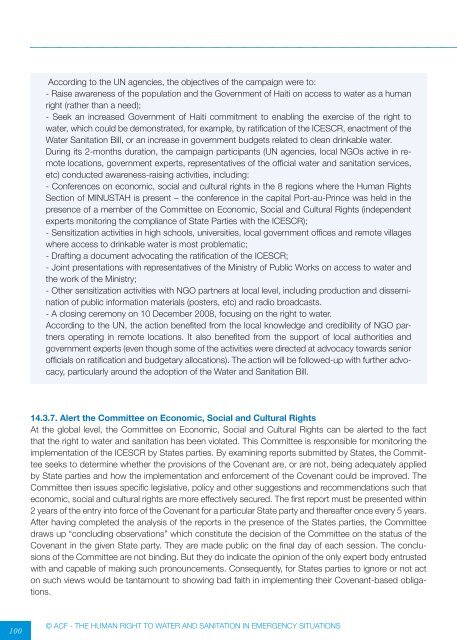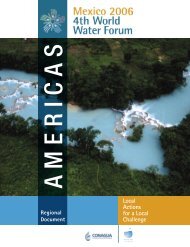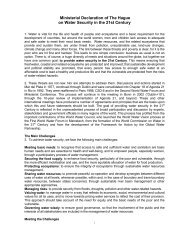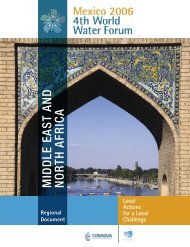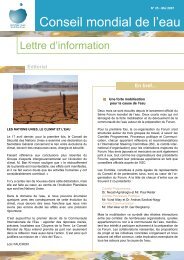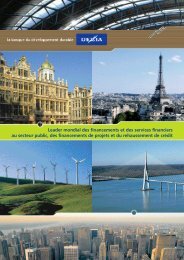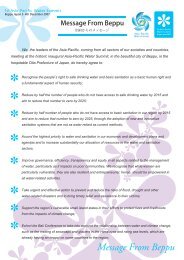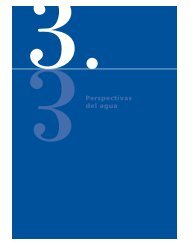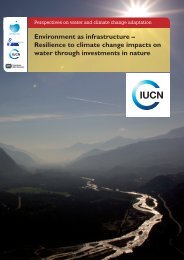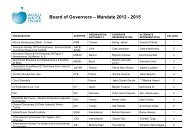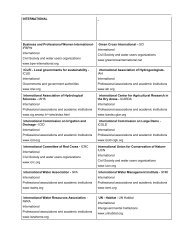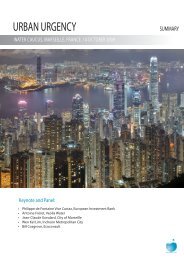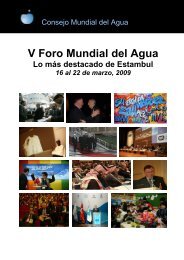the human right to water and sanitation in emergency situations
the human right to water and sanitation in emergency situations
the human right to water and sanitation in emergency situations
You also want an ePaper? Increase the reach of your titles
YUMPU automatically turns print PDFs into web optimized ePapers that Google loves.
100<br />
Accord<strong>in</strong>g <strong>to</strong> <strong>the</strong> UN agencies, <strong>the</strong> objectives of <strong>the</strong> campaign were <strong>to</strong>:<br />
- Raise awareness of <strong>the</strong> population <strong>and</strong> <strong>the</strong> Government of Haiti on access <strong>to</strong> <strong>water</strong> as a <strong>human</strong><br />
<strong>right</strong> (ra<strong>the</strong>r than a need);<br />
- Seek an <strong>in</strong>creased Government of Haiti commitment <strong>to</strong> enabl<strong>in</strong>g <strong>the</strong> exercise of <strong>the</strong> <strong>right</strong> <strong>to</strong><br />
<strong>water</strong>, which could be demonstrated, for example, by ratification of <strong>the</strong> ICESCR, enactment of <strong>the</strong><br />
Water Sanitation Bill, or an <strong>in</strong>crease <strong>in</strong> government budgets related <strong>to</strong> clean dr<strong>in</strong>kable <strong>water</strong>.<br />
Dur<strong>in</strong>g its 2-months duration, <strong>the</strong> campaign participants (UN agencies, local NGOs active <strong>in</strong> remote<br />
locations, government experts, representatives of <strong>the</strong> official <strong>water</strong> <strong>and</strong> <strong>sanitation</strong> services,<br />
etc) conducted awareness-rais<strong>in</strong>g activities, <strong>in</strong>clud<strong>in</strong>g:<br />
- Conferences on economic, social <strong>and</strong> cultural <strong>right</strong>s <strong>in</strong> <strong>the</strong> 8 regions where <strong>the</strong> Human Rights<br />
Section of MINUSTAH is present – <strong>the</strong> conference <strong>in</strong> <strong>the</strong> capital Port-au-Pr<strong>in</strong>ce was held <strong>in</strong> <strong>the</strong><br />
presence of a member of <strong>the</strong> Committee on Economic, Social <strong>and</strong> Cultural Rights (<strong>in</strong>dependent<br />
experts moni<strong>to</strong>r<strong>in</strong>g <strong>the</strong> compliance of State Parties with <strong>the</strong> ICESCR);<br />
- Sensitization activities <strong>in</strong> high schools, universities, local government offices <strong>and</strong> remote villages<br />
where access <strong>to</strong> dr<strong>in</strong>kable <strong>water</strong> is most problematic;<br />
- Draft<strong>in</strong>g a document advocat<strong>in</strong>g <strong>the</strong> ratification of <strong>the</strong> ICESCR;<br />
- Jo<strong>in</strong>t presentations with representatives of <strong>the</strong> M<strong>in</strong>istry of Public Works on access <strong>to</strong> <strong>water</strong> <strong>and</strong><br />
<strong>the</strong> work of <strong>the</strong> M<strong>in</strong>istry;<br />
- O<strong>the</strong>r sensitization activities with NGO partners at local level, <strong>in</strong>clud<strong>in</strong>g production <strong>and</strong> dissem<strong>in</strong>ation<br />
of public <strong>in</strong>formation materials (posters, etc) <strong>and</strong> radio broadcasts.<br />
- A clos<strong>in</strong>g ceremony on 10 December 2008, focus<strong>in</strong>g on <strong>the</strong> <strong>right</strong> <strong>to</strong> <strong>water</strong>.<br />
Accord<strong>in</strong>g <strong>to</strong> <strong>the</strong> UN, <strong>the</strong> action benefited from <strong>the</strong> local knowledge <strong>and</strong> credibility of NGO partners<br />
operat<strong>in</strong>g <strong>in</strong> remote locations. It also benefited from <strong>the</strong> support of local authorities <strong>and</strong><br />
government experts (even though some of <strong>the</strong> activities were directed at advocacy <strong>to</strong>wards senior<br />
officials on ratification <strong>and</strong> budgetary allocations). The action will be followed-up with fur<strong>the</strong>r advocacy,<br />
particularly around <strong>the</strong> adoption of <strong>the</strong> Water <strong>and</strong> Sanitation Bill.<br />
14.3.7. Alert <strong>the</strong> Committee on Economic, Social <strong>and</strong> Cultural Rights<br />
At <strong>the</strong> global level, <strong>the</strong> Committee on Economic, Social <strong>and</strong> Cultural Rights can be alerted <strong>to</strong> <strong>the</strong> fact<br />
that <strong>the</strong> <strong>right</strong> <strong>to</strong> <strong>water</strong> <strong>and</strong> <strong>sanitation</strong> has been violated. This Committee is responsible for moni<strong>to</strong>r<strong>in</strong>g <strong>the</strong><br />
implementation of <strong>the</strong> ICESCR by States parties. By exam<strong>in</strong><strong>in</strong>g reports submitted by States, <strong>the</strong> Committee<br />
seeks <strong>to</strong> determ<strong>in</strong>e whe<strong>the</strong>r <strong>the</strong> provisions of <strong>the</strong> Covenant are, or are not, be<strong>in</strong>g adequately applied<br />
by State parties <strong>and</strong> how <strong>the</strong> implementation <strong>and</strong> enforcement of <strong>the</strong> Covenant could be improved. The<br />
Committee <strong>the</strong>n issues specific legislative, policy <strong>and</strong> o<strong>the</strong>r suggestions <strong>and</strong> recommendations such that<br />
economic, social <strong>and</strong> cultural <strong>right</strong>s are more effectively secured. The first report must be presented with<strong>in</strong><br />
2 years of <strong>the</strong> entry <strong>in</strong><strong>to</strong> force of <strong>the</strong> Covenant for a particular State party <strong>and</strong> <strong>the</strong>reafter once every 5 years.<br />
After hav<strong>in</strong>g completed <strong>the</strong> analysis of <strong>the</strong> reports <strong>in</strong> <strong>the</strong> presence of <strong>the</strong> States parties, <strong>the</strong> Committee<br />
draws up “conclud<strong>in</strong>g observations” which constitute <strong>the</strong> decision of <strong>the</strong> Committee on <strong>the</strong> status of <strong>the</strong><br />
Covenant <strong>in</strong> <strong>the</strong> given State party. They are made public on <strong>the</strong> f<strong>in</strong>al day of each session. The conclusions<br />
of <strong>the</strong> Committee are not b<strong>in</strong>d<strong>in</strong>g. But <strong>the</strong>y do <strong>in</strong>dicate <strong>the</strong> op<strong>in</strong>ion of <strong>the</strong> only expert body entrusted<br />
with <strong>and</strong> capable of mak<strong>in</strong>g such pronouncements. Consequently, for States parties <strong>to</strong> ignore or not act<br />
on such views would be tantamount <strong>to</strong> show<strong>in</strong>g bad faith <strong>in</strong> implement<strong>in</strong>g <strong>the</strong>ir Covenant-based obligations.<br />
© ACF - THE HUMAN RIGHT TO WATER AND SANITATION IN EMERGENCY SITUATIONS


